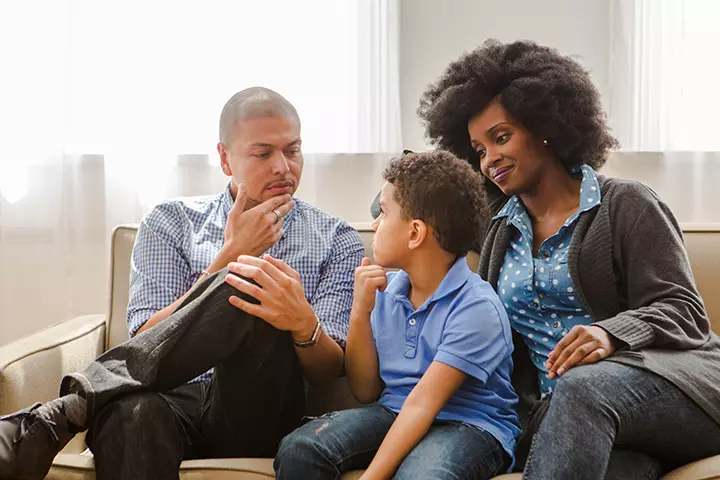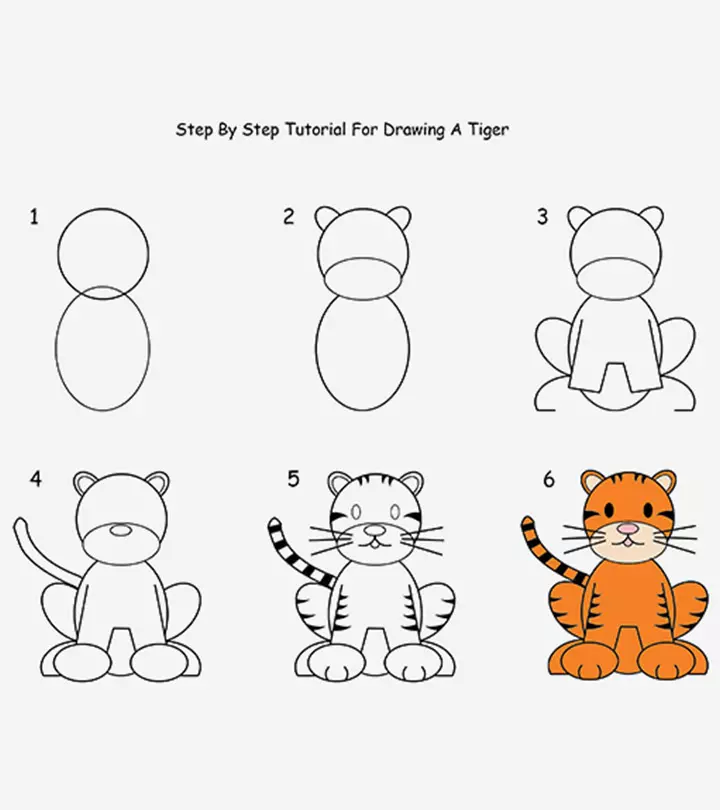
Image: Shutterstock
Most parents strive to make their children the best version of themselves. In this quest, they try to imbibe several character traits for kids that could help them transform into better individuals. If you are a parent, all you wish for your child is to be happy, successful, and praised for being well-behaved all the time. One way to ensure your child’s good overall development is by educating them to develop positive character attributes. It is a great idea to teach your children about these traits from a young age while at home. We have explored several research papers and trusted websites to understand the role of character traits in children’s emotional and social development. Read on to learn about them and know how you can encourage them in your child.

Key Pointers
- Life experiences and the family and social environment play major roles in a child’s character development.
- Children mirror most parents’ actions and words, so being a role model with positive traits can help you inspire them.
- Inculcating self-discipline, patience, and respect in kids help them control their impulsive behavior and build a strong character.
How Do You Teach Character Traits To Children?
A child’s character is shaped by the community, school, family, and their individual choices, experiences, and temperament. As a parent, you have multiple tools and opportunities to build your child’s character. Try the following ways and see your little one grow into a person of integrity and character.
1. Be role models
Experts state that parents are responsible for teaching children how to talk, walk, make healthy and wise decisions, and imbibe important values (1). If you exhibit good and positive traits in your everyday actions, your children will notice them and have the motivation to acquire such traits. Similarly, if you practice generosity and compassion, your children will naturally adopt those qualities too.
Indra Raj Pathak, a father and an educator, reveals how he and his spouse consistently prioritize exemplifying honesty through their behavior. He shares, “This commitment was put to the test during a recent incident when I accidentally broke a precious showpiece. While it was tempting to concoct a tale to divert the blame, I chose to be honest about my mistake. Admitting my fault not only taught my children the importance of taking responsibility but also reinforced the idea that honesty, even in difficult situations, is the right path (i).”
 Quick tip
Quick tip2. Use teachable moments to build character
As per a study published in the International Journal of Science and Research, the process of using teachable moments includes finding the right moment, building rapport, understanding the learner’s perspective, presenting the concept, clarifying the approach, evaluating alternative propositions, and adding to the learner’s experience for better understanding (3). For instance, when your child is dishonest, you can seize the opportunity to teach them about honesty. Explain that dishonesty is wrong and is best resolved by being accountable and confessing.
Tip: When you correct them, always take the opportunity to explain why their behavior is wrong.
3. Narrate stories from literature and life

Long before books, parents and grandparents taught moral lessons by narrating life experiences, telling stories, and taking inspiration from their surroundings. A study published in the Harvard Educational Review shows that narratives play a central role in moral development and education (4). Therefore, whether it is bedtime stories or those you tell your child in the middle of the day, they can help children distinguish right from wrong.
4. Provide opportunities for practice
Children have to put the character traits they learn into practice before these come naturally to them. They need hands-on experience to know the true meaning of character traits. For instance, you may explain to your child what kindness means or model it around them, but the child may not grasp the concept unless they have experienced it. To help them build good character traits, you can encourage activities such as volunteering, doing age-appropriate chores, and practicing mindfulness.
10 Character Traits For Kids To Develop
Here are a few essential character traits that you could teach your children.
1. Humility
Humility is the ability to be modest and down-to-earth in all circumstances. Children who lack humility may grow up to be arrogant adults. As parents, you don’t want that. As parents, you want your child to be successful in whatever they do and acknowledge the role of their role models, mentors, and others who help them. They should also not take for granted the opportunities or privileges they have but be grateful for them.
You don’t want your children to look down on others or feel self-important. Humility teaches a child to be self-assured, and when they’re self-assured, they don’t feel the need to brag about their talents and achievements or feel inferior to others.
Here’s how you can instill humility in your children.
- Set a good example to children. When a parent gives credit to others, accepting they don’t know an answer, or admits to a mistake, they encourage children to do the same.
- Another excellent tool is role-playing. Talk your child through varied scenarios and help them distinguish between positive behavior and bad behavior.
2. Contentment

Contentment entails being happy with who you are, what you have, and where you are. Here are a few reasons why you should teach contentment to your child.
- If your children are content, they will have peace of mind and be happy with the present. They will be content with whatever they achieve but stay motivated to work hard.
- A trait such as contentment also extends to others. When you are content, you begin to accept others, including their flaws. This strengthens relationships.
- A content child can easily differentiate between needs and wants. While they may want a lot of things, they realize that joy goes beyond material things.
- Most importantly, contentment brings happiness. Rather than wanting something that is beyond your reach or means or being greedy, you accept the situation and are grateful.
Celebrating small wins or events, practicing gratitude, giving to others, teaching them the value of money, and being role models will go a long way in helping your children find contentment.
3. Dependability
A child needs to be dependable for anyone to count on them. Whether it’s in school or at home, people should be able to trust your child and rely on them. Being reliable or trustworthy often leads to positive recognition.
Start by teaching your children to be dependable in small commitments and obligations. For example, assign your child a simple task, such as feeding a pet every morning. Praise them when they do it and gradually increase their duties—these could include watering plants or setting the table for dinner. This approach can help prepare them to take on larger responsibilities and manage greater things as they grow into adults.
4. Grit

Grit refers to the perseverance and passion one shows to achieve meaningful and long-term goals. Help your child to have a never-give-up attitude and instill the values of dedication and hard work in them.
Once you make your child believe that anything is possible with hard work and commitment, they’ll be unstoppable! Moreover, they’ll learn that there are no shortcuts to big achievements and nothing great comes easy.
Here are a few ways in which you can help your child build grit and resilience.
- Steer clear from the “the grass is always greener on the other side” line of thought and help your child concentrate on the assignment or task at hand. For example, if they find a math problem difficult, they need to pay more attention to it rather than skipping it.
- Help your child find their passion. When they are passionate about something, it becomes easier for them to focus on it and work towards a goal with grit. In other words, their passion makes them want to put in extra time and effort.
- Praise perseverance and effort and encourage them to value the hard work that goes into achieving something.
 Quick fact
Quick fact5. Patience
Good things indeed come to those who wait. Children who learn patience are more likely to succeed. One of the many benefits of being patient is that it helps you make better decisions. When you are patient, you lay your frustrations aside, get your feelings and thoughts back in control and order, think positively, and make better decisions. Some ways by which you can teach your child patience include waiting in line without cribbing, taking turns playing on the phone, and counting to 10 when they get upset over something.
Here are a few reasons why you need to teach your children patience.
- It helps you set and achieve your long-term goals. When there’s a minor setback, your child will know how to push through and come out stronger.
- Being patient allows you to be more mindful and rational and make informed choices. You do not let emotions cloud your judgment.
- Patience ensures better mental health. Instead of worrying too much or always thinking about the ‘what ifs,’ you let your mind rest.
6. Honesty

“Honesty is the best policy” is an age-old adage that holds good until this day.
Children need to be taught the concept of honesty from an early age. Not only does honesty teach your child right from wrong, but it also teaches them to be sincere and truthful. An honest person gains people’s respect. Honesty can also lead to a happy, successful, and fulfilling life. Honest children grow up to be reliable individuals and successful professionals. To instill this value, model honesty yourself, and when your child admits to a mistake, praise their honesty and work together to find a solution rather than scolding them.
7. Courage
Children need gentle nudges to step out of their comfort zone and try something new or discover their inner strength. Learning anything new involves entering unknown territory and taking on challenges.
Your child needs to learn to overcome their fears, and as parents, it’s your job to help your children find the courage to do the right things. The next time your child is hesitant about a new experience, such as swimming or dance class, try using role-play games or storytelling to ease them into it. Having courage helps children
- Gain self-confidence.
- Stand their ground.
- Overcome peer pressure.
- Admit to mistakes.
- Share their work or thoughts even in the face of criticism.
- Do the right thing in difficult situations.
- Fight the good fight.
- Stand up for themselves.
- Try new things.
- Say no to temptations.
8. Adaptability
Adaptability refers to the ability to adjust to different conditions. While adaptability might seem like an advanced skill for a child, it’s important to nurture it early in life. It can help them navigate through several obstacles.
In children, adaptability can manifest in ways they shift gears between tasks without throwing a tantrum, learn to react to new information, and respond to change positively. To help them adapt, you could establish predictable routines while leaving room for flexibility or give them small choices in their daily routines, like what clothes to wear or what snacks to have.
9. Self-discipline
Self-discipline and self-control go beyond good behavior. Children who possess self-discipline learn to
- Control impulsive behavior.
- Weigh the pros and cons and make healthy choices.
- Cope with uncomfortable emotions.
- Take responsibility for their behavior.
- Understand the significance of making healthy decisions.
- Take the high road.
- Respond respectfully when adults correct them.
Self-discipline promotes good judgment and empowers your child to make good choices. To help them learn self-discipline, you should set clear expectations, create a routine, and encourage your child to wait for the rewards.
10. Respect

Respect is one of the most fundamental traits a person needs to be successful both personally and professionally. It’s essential to teach a child respect in their formative years.
Respect helps you feel safe and express yourself without being oppressed, embarrassed, or judged, and it teaches you to accept people for who they are, even when you disagree with them or they’re different from you.
Respect starts at home. You must teach children to respect their elders and other children. One of the most effective ways to teach children to behave respectfully is to be role models. Children will pick a thing or two when the environment around them is healthy and conducive to learning.
Frequently Asked Questions
1. What are the character-building activities for kids?
Activities that teach virtues such as respect, honesty, empathy, and kindness may promote character-building in children. Telling stories with moral messages, engaging in kindness activities for kids, such as community service, encouraging teamwork through group activities, and playing word games that describe good and bad characters are fun character-building activities you could try with your children.
2. What are some negative character traits?
People usually have both positive and negative character traits, and the heavier side of the balance may describe the person’s overall character. Some negative character traits are being rude, greedy, disrespectful, dishonest, unkind, arrogant, selfish, and argumentative.
3. What are the benefits of developing positive character traits in children?
Cultivating positive character traits in children facilitates the formation of meaningful connections, nurtures empathy and kindness, and boosts self-confidence and adaptability. Also, these traits enable responsible and moral conduct in children and equip them to contribute positively to society. Note that positive reinforcement for kids is essential in encouraging these behaviors.
4. What are the consequences of not teaching character traits to children?
Failing to teach healthy character traits to children could make it difficult for them to build healthy relationships, lead to a lack of moral awareness and empathy, low self-esteem, and irresponsible behavior. Not inculcating these traits in your children could also impede their capacity for personal development and all-around achievement.
5. How do cultural values influence character traits for kids?
From food habits to respect for their elders, nature, and animals, the culture and tradition of the family and society come from influencing a child’s personality and character traits. Therefore, it is essential to teach children cultural values from a young age and enlighten them on how upholding and carrying them forward helps their holistic growth.
Teaching children positive traits may help them become better individuals. Positive behavior in children can be reinforced by consistently demonstrating and encouraging these traits. Children tend to mimic adults and learn from them, so try to be a role model to them. Express and adhere to the traits you wish your children to follow. Characteristics like contentment, humility, patience, honesty, and courage will get them a winning and positive personality. Qualities such as optimism, tolerance, fairness, and cooperation, further help them lead a fulfilling life. Although this is a challenging task, it isn’t an impossible one. You may hit a few setbacks. Nevertheless, make every possible incident a teachable moment and shape them into good individuals.
Infographic: Books For Character Development In Children
Children understand better when the learning is fun and interesting. If you want your child to understand the value of the different noble character traits, what better way to teach them than using a visual representation of color picture books? So here are a few books for them, each containing a different moral and character trait.
Some thing wrong with infographic shortcode. please verify shortcode syntax
Illustration: Positive Character Traits For Kids & Ways To Develop Them

Image: Dall·E/MomJunction Design Team
Do you want your kid to imbibe positive character traits to help them grow as better individuals? Unlock the secrets of boosting your self-esteem and uncovering your unique character traits in this captivating video for kids!
Personal Experience: Source
MomJunction articles include first-hand experiences to provide you with better insights through real-life narratives. Here are the sources of personal accounts referenced in this article.
i. 5 Strategies to teach children about honesty in a world full of lieshttps://medium.com/publishous/5-strategies-to-teach-children-about-honesty-in-a-world-full-of-lies-acc7f3062fa4
References
- Parents as Role Models
https://www.aces.edu/blog/topics/home-family-urban/parents-as-role-models/#:~:text=Children%20are%20born%20with%20limited,make%20healthy%20and%20wise%20decisions. - How to Develop Positive Character Traits at School and Home
https://ripplekindness.org/teaching-character-traits-at-home-and-in-the-classroom/ - Vijay Grover; (2015); Teachable Moments: A Tool for Improving Learner ” s Learning in Depth and Breath
https://www.researchgate.net/publication/272743239_Teachable_Moments_A_Tool_for_Improving_Learner_s_Learning_in_Depth_and_Breath - Mark B Tappan et al.; (1989);Stories Told and Lessons Learned: Toward a Narrative Approach to Moral Development and Moral Education
https://www.researchgate.net/publication/279741978_Stories_Told_and_Lessons_Learned_Toward_a_Narrative_Approach_to_Moral_Development_and_Moral_Education
Community Experiences
Join the conversation and become a part of our nurturing community! Share your stories, experiences, and insights to connect with fellow parents.
Read full bio of Dr. Neha Bhave Salankar
Read full bio of Apoorva K
Read full bio of Harshita Makvana
Read full bio of Shinta Liz Sunny
















